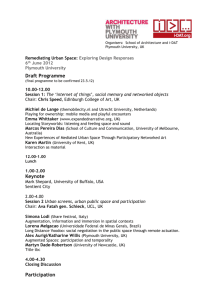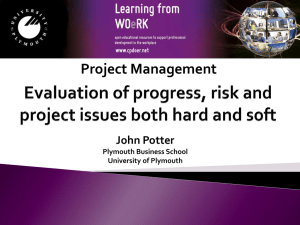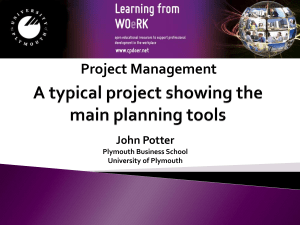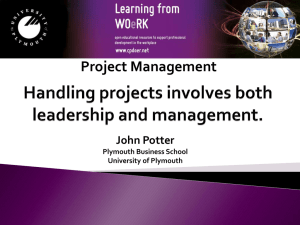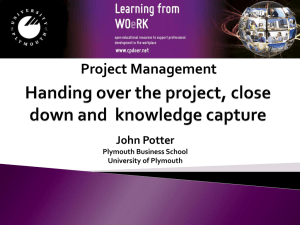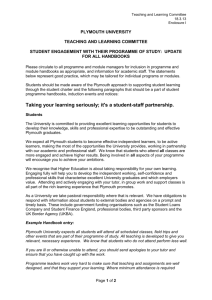PALS in Partner Colleges
advertisement
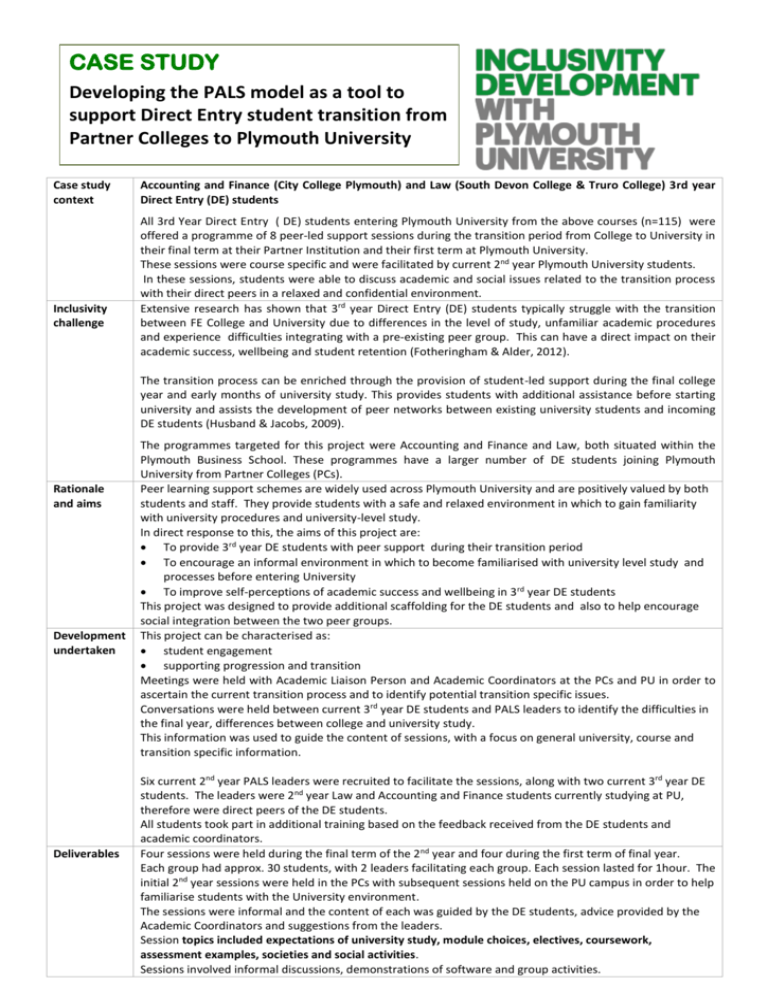
CASE STUDY Developing the PALS model as a tool to support Direct Entry student transition from Partner Colleges to Plymouth University Case study context Inclusivity challenge Accounting and Finance (City College Plymouth) and Law (South Devon College & Truro College) 3rd year Direct Entry (DE) students All 3rd Year Direct Entry ( DE) students entering Plymouth University from the above courses (n=115) were offered a programme of 8 peer-led support sessions during the transition period from College to University in their final term at their Partner Institution and their first term at Plymouth University. These sessions were course specific and were facilitated by current 2nd year Plymouth University students. In these sessions, students were able to discuss academic and social issues related to the transition process with their direct peers in a relaxed and confidential environment. Extensive research has shown that 3rd year Direct Entry (DE) students typically struggle with the transition between FE College and University due to differences in the level of study, unfamiliar academic procedures and experience difficulties integrating with a pre-existing peer group. This can have a direct impact on their academic success, wellbeing and student retention (Fotheringham & Alder, 2012). The transition process can be enriched through the provision of student-led support during the final college year and early months of university study. This provides students with additional assistance before starting university and assists the development of peer networks between existing university students and incoming DE students (Husband & Jacobs, 2009). Rationale and aims Development undertaken Deliverables The programmes targeted for this project were Accounting and Finance and Law, both situated within the Plymouth Business School. These programmes have a larger number of DE students joining Plymouth University from Partner Colleges (PCs). Peer learning support schemes are widely used across Plymouth University and are positively valued by both students and staff. They provide students with a safe and relaxed environment in which to gain familiarity with university procedures and university-level study. In direct response to this, the aims of this project are: To provide 3rd year DE students with peer support during their transition period To encourage an informal environment in which to become familiarised with university level study and processes before entering University To improve self-perceptions of academic success and wellbeing in 3rd year DE students This project was designed to provide additional scaffolding for the DE students and also to help encourage social integration between the two peer groups. This project can be characterised as: student engagement supporting progression and transition Meetings were held with Academic Liaison Person and Academic Coordinators at the PCs and PU in order to ascertain the current transition process and to identify potential transition specific issues. Conversations were held between current 3rd year DE students and PALS leaders to identify the difficulties in the final year, differences between college and university study. This information was used to guide the content of sessions, with a focus on general university, course and transition specific information. Six current 2nd year PALS leaders were recruited to facilitate the sessions, along with two current 3rd year DE students. The leaders were 2nd year Law and Accounting and Finance students currently studying at PU, therefore were direct peers of the DE students. All students took part in additional training based on the feedback received from the DE students and academic coordinators. Four sessions were held during the final term of the 2nd year and four during the first term of final year. Each group had approx. 30 students, with 2 leaders facilitating each group. Each session lasted for 1hour. The initial 2nd year sessions were held in the PCs with subsequent sessions held on the PU campus in order to help familiarise students with the University environment. The sessions were informal and the content of each was guided by the DE students, advice provided by the Academic Coordinators and suggestions from the leaders. Session topics included expectations of university study, module choices, electives, coursework, assessment examples, societies and social activities. Sessions involved informal discussions, demonstrations of software and group activities. Benefits and impact The project has shown that a peer-run support programme is beneficial for 3rd year DE students by helping prepare them for the transition from college to university and has a positive impact on concerns and issues that students have during this period. The sessions have been positively received by the DE students as it provides them with a relaxed environment in which to familiarise themselves with the procedures and processes relevant to their chosen course and meet fellow students. This has the added benefit of not only encouraging social networks between the entering students and their peers at Plymouth University but also between other DE students entering the same course. Evaluation- 32 student questionnaire responses Attendance of PALS sessions has led to a statistically significant improvement (p=0.007) in students’ level of concern regarding successful management of the transition stage. After 3 sessions, students showed an improvement in course specific concerns regarding the understanding of subject/lecture content, managing assessments and time, an improvement in other general university concerns regarding settling into university life and where to find help when needed. 87% of attending students enjoyed the sessions 100% of students found the sessions to be a safe and secure environment to ask questions 96% found the leaders to be friendly and approachable 94% found it helpful to learn about leaders’ experiences and programme expectations 87% of students found the sessions to be relaxed enough to share experiences 75% of students felt the sessions helped to build their communication skills 69% of students felt the sessions helped to build their self confidence Student comments: “What did you enjoy most about your peer assisted learning sessions?” “The honesty and openness of the questions answered” “The opportunity to meet other students who come from other Partner Colleges and those who come from Plymouth”, “Being able to have my questions answered by people my age who understand” “ Learn new things which will help with the bridging module” “ The leaders were super friendly and lovely” “These sessions were fun and helpful and it's nice to speak to people who are going through the process and have the insider point of view” The provision of student-led support sessions for 3rd year DE students has not only benefited the progressing DE students but has also had a positive impact on the 3 rd year DE students who helped facilitate the sessions“I just wanted to say thanks for letting me be involved in the PALS process. I found it very helpful for my development and will be speaking about it in my upcoming interviews for jobs” Lessons learned The project has highlighted the importance of providing a peer support network for 3rd year DE students to assist in the transition process by encouraging contact between current university students and DE students before the transition takes place. This project has the added benefit of including 3 rd year DE students in the facilitation of these sessions alongside peers so that the progressing students can learn first-hand from previous DE students as well as fellow students who they will be joining in their final year. Therefore, the transition period for DE students entering PU could be enhanced across the university by encouraging greater interaction between DE students and their university peers as early as possible to enable support networks to be developed and information shared before the transition period takes place. Further opportunities Contact Greater communications between DE students who have progressed to university and those who are due to progress will also help support the transition period by providing relatable experience that they themselves can learn from. The work described is being shared across other schools within PU and other PCs to further investigate the benefit of peer led support for a successful transition period. Rachel Shaw, PALS in Partner Colleges ID coordinator: rachel.shaw@plymouth.ac.uk Carolyn Gentle, PALS coordinator: carolyn.gentle@plymouth.ac.uk Inclusivity Development Learning Support and Wellbeing Learning Gateway Roland Levinsky Building T E 01752 587676 lsw@plymouth.ac.uk
